20 start with O start with O
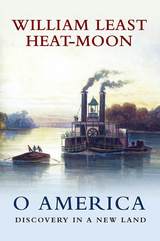
Traveling by foot, horse, stage, canal boat, and steamer, Nathaniel and Nicodemus explore the backcountry and forge a deep friendship as they encounter a host of memorable characters who reveal the nature of the American experiment, one still in its early stages but already under the stress of social injustices and economic inequities.
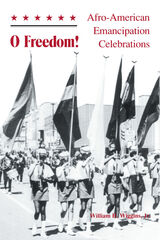

In recent decades, Virginia Woolf’s contribution to literary history has been located primarily within a female tradition. Elizabeth Abel dislodges Woolf from her iconic place within this tradition to uncover her shadowy presence in other literary genealogies. Abel elicits unexpected echoes of Woolf in four major writers from diverse cultural contexts: Nella Larsen, James Baldwin, Roland Barthes, and W. G. Sebald. By mapping the wayward paths of what Woolf called “odd affinities” that traverse the boundaries of gender, race, and nationality, Abel offers a new account of the arc of Woolf’s career and the transnational modernist genealogy constituted by her elusive and shifting presence. Odd Affinities will appeal to students and scholars working in New Modernist studies, comparative literature, gender and sexuality studies, and African American studies.

The emergence of a master artist alongside his first major collection, created during a golden age of art in the nation’s capital
Renowned for his innovative work with silkscreen printing, Lou Stovall’s works are part of numerous collections, including the National Gallery of Art, Smithsonian American Art Museum, and Phillips Collection. Washington Post art critic Paul Richard once wrote, “As a printer of his own art, and of the art of many others, as a framer and installer and shepherd of collections, Stovall has inserted more art into Washington than almost anyone in town.”
Of the Land: The Art and Poetry of Lou Stovall presents a series of prints and accompanying poems that showcase the artist’s work during the 1970s, when he was developing his unique silkscreen technique and exploring both natural and abstract elements. An introduction by the book’s editor and artist’s son, Will Stovall, along with an autobiography from the artist anchor the Of the Land series in its time and place—a period of jazz, protest, and prolific art production in Washington, DC, that birthed the Washington Color School. Stovall’s contributions, as well as his collaborations with well-known artists like Jacob Lawrence, Sam Gilliam, Elizabeth Catlett, and Robert Mangold, have cemented him as one of the most significant American artists of our age.
Part of a tradition of African American artists and thinkers who met at Howard University, Lou Stovall created the Workshop in 1968, a small, active silkscreen studio printing posters for arts and DC-focused events. His deep influence on the silkscreen medium, the art community, and DC will be part of his lasting legacy.
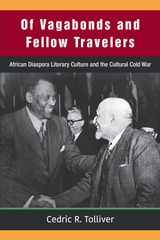
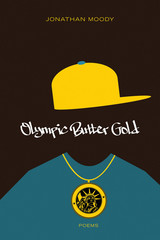
Jonathan Moody grew up during the Golden Ages of hip-hop and listened to rap that was as adventurous and diverse as his military upbringing. When rap’s Golden Ages expired, the music’s innovativeness and variety diminished. Moody’s second book, Olympic Butter Gold, winner of the 2014 Cave Canem Northwestern University Press Poetry Prize, responds to Chuck D’s claim that "if there was a HIP-HOP or Rap Olympics, I really don’t think the United States would get Gold, Silver or Brass." From the poem "Opening Ceremony," in the voice of a heroin addict struggling to use Lady Liberty’s torch to cook "The American Dream," to "Dear 2Pac," an autobiographical account of teaching Tupac Shakur’s poetry to engage high school students indifferent to literature, Moody shares a worldview that is simultaneously apocalyptic and promising.
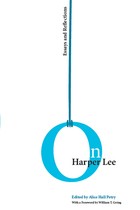
On Harper Lee is an eclectic combination of academic and familiar essays. John Carlos Rowe discusses economic issues in the novel; Jacqueline Tavernier-Courbin looks at Lee's handling of humor; Robert Butler examines the novel within the context of Christian religious allegory; Jean Frantz Blackall traces the similarities between To Kill a Mockingbird and the novels of Lee's favorite author, Jane Austen; and Kathryn Lee Seidel examines how the character of Scout comes to approximate the ideals of Stoicism embodied in her father, Atticus Finch.
In what is perhaps the most controversial chapter in the collection, Laura Fine examines how To Kill a Mockingbird follows the pattern of lesbian coming-of-age fiction, arguing that the subtext “is the drama of Scout herself, of her conflicted private hopes to be accepted as an outsider.” Likewise controversial Lesley Marx recounts the reaction to Lee's novel in her native South Africa. Because Mockingbird holds such tremendous personal appeal for so many readers, Petry has included three familiar essays by noted writers Doris Betts, Gerald Early, and Nichelle D. Tramble.
Written for scholars as well as general readers, On Harper Lee is an accessible collection on one of America's most important novels and its often enigmatic creator.
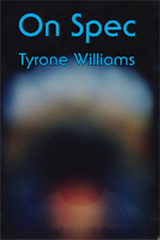

From basic training at Camp Meigs in Readville, Massachusetts, through campaigns in Georgia, South Carolina, and Florida, Gooding faithfully records the activities of the 54th, including the legendary storming of Fort Wagner. He also voices the injustice felt by soldiers of his regiment over the issue of unequal pay, the refusal to promote deserving black enlistees to officer rank, and the deeply ingrained racism of whites in both the North and South.
Wounded and captured during the battle of Olustee, Florida, in February 1864, Gooding died later that year in Andersonville Prison.
In her introduction, Virginia M. Adams provides biographical details on Gooding's life and examines the antebellum history of New Bedford's large and articulate community of free blacks.
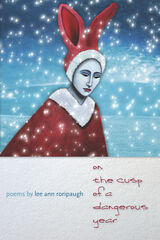
Lady Murasaki wrote in The Tale of Genji that thirty-seven is “a dangerous year” for women. Evoking the styles of Murasaki and other women writers of the Heian-period Japanese court, Lee Ann Roripaugh presents a collection of confessional poems charting the course of that perilous year. Roripaugh, in both an homage to and a dialogue with women writers of the past, explores the trials of women facing the treacherous waters of time while losing none of the grace and decadence of femininity. Often calling upon the passing of the seasons and revelations of nature, these lyrically elegant poems chronicle the dangers and delights of a range of issues facing contemporary women—from bisexuality and biracial culture and identity, to restless nights and lingering memories of the past. The pleasures of the senses collide with parallels of time and the natural world; tangible solitude lies down beside wistful memories of relationships gone by. What is ultimately revealed is both heartbreaking and illuminating. At once provocative, humorous, and bittersweet, On the Cusp of a Dangerous Year is a pillow book for the twenty-first century, providing a candid and whimsical look into the often tumultuous universe of the modern woman.

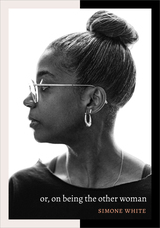
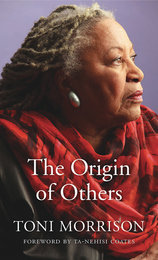
America’s foremost novelist reflects on the themes that preoccupy her work and increasingly dominate national and world politics: race, fear, borders, the mass movement of peoples, the desire for belonging. What is race and why does it matter? What motivates the human tendency to construct Others? Why does the presence of Others make us so afraid?
Drawing on her Norton Lectures, Toni Morrison takes up these and other vital questions bearing on identity in The Origin of Others. In her search for answers, the novelist considers her own memories as well as history, politics, and especially literature. Harriet Beecher Stowe, Ernest Hemingway, William Faulkner, Flannery O’Connor, and Camara Laye are among the authors she examines. Readers of Morrison’s fiction will welcome her discussions of some of her most celebrated books—Beloved, Paradise, and A Mercy.
If we learn racism by example, then literature plays an important part in the history of race in America, both negatively and positively. Morrison writes about nineteenth-century literary efforts to romance slavery, contrasting them with the scientific racism of Samuel Cartwright and the banal diaries of the plantation overseer and slaveholder Thomas Thistlewood. She looks at configurations of blackness, notions of racial purity, and the ways in which literature employs skin color to reveal character or drive narrative. Expanding the scope of her concern, she also addresses globalization and the mass movement of peoples in this century. National Book Award winner Ta-Nehisi Coates provides a foreword to Morrison’s most personal work of nonfiction to date.
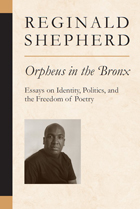
"Orpheus in the Bronx not only extols the freedom language affords us; it embodies that freedom, enacting poetry's greatest gift---the power to recognize ourselves as something other than what we are. These bracing arguments were written by a poet who sings."
---James Longenbach
A highly acute writer, scholar, editor, and critic, Reginald Shepherd brings to his work the sensibilities of a classicist and a contemporary theorist, an inheritor of the American high modernist canon, and a poet drawing and playing on popular culture, while simultaneously venturing into formal experimentation.
In the essays collected here, Shepherd offers probing meditations unified by a "resolute defense of poetry's autonomy, and a celebration of the liberatory and utopian possibilities such autonomy offers." Among the pieces included are an eloquent autobiographical essay setting out in the frankest terms the vicissitudes of a Bronx ghetto childhood; the escape offered by books and "gifted" status preserved by maternal determination; early loss and the equivalent of exile; and the formation of the writer's vocation. With the same frankness that he brings to autobiography, Shepherd also sets out his reasons for rejecting "identity politics" in poetry as an unnecessary trammeling of literary imagination. His study of the "urban pastoral," from Baudelaire through Eliot, Crane, and Gwendolyn Brooks, to Shepherd's own work, provides a fresh view of the place of urban landscape in American poetry.
Throughout his essays---as in his poetry---Shepherd juxtaposes unabashed lyricism, historical awareness, and in-your-face contemporaneity, bristling with intelligence.
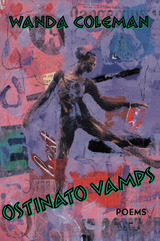
Linguistically daring, lyrically breathtaking, stylistically bold, these poems both explore familiar territory and shatter stereotypes. Life is difficult, often unfair, but it belongs to the living, as Coleman reminds us in no uncertain terms. Racing between an earthy eroticism and fatalistic despair, filled with humor and tragedy, these poems are alive. They breathe. They challenge us even as they reward us for seeking the truth.
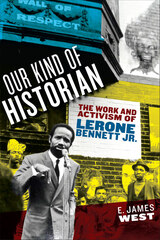
Journalist, activist, popular historian, and public intellectual, Lerone Bennett Jr. left an indelible mark on twentieth-century American history and culture. Rooted in his role as senior editor of Ebony magazine, but stretching far beyond the boundaries of the Johnson Publishing headquarters in Chicago, Bennett’s work and activism positioned him as a prominent advocate for Black America and a scholar whose writing reached an unparalleled number of African American readers.
This critical biography—the first in-depth study of Bennett’s life—travels with him from his childhood experiences in Jim Crow Mississippi and his time at Morehouse College in Atlanta to his later participation in a dizzying range of Black intellectual and activist endeavors. Drawing extensively on Bennett’s previously inaccessible archival collections at Emory University and Chicago State, as well as interviews with close relatives, colleagues, and confidantes, Our Kind of Historian celebrates his enormous influence within and unique connection to African American communities across more than half a century of struggle.
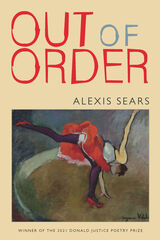
Alexis Sears’s debut collection, Out of Order, is a collage of unapologetic intimacy, risk-taking vulnerability, and unwavering candor. A biracial millennial woman, Sears navigates the challenges of growing out of girlhood and into womanhood with its potential dangers, interrogating the male gaze, beauty standards, and confidence and identity. Pop culture references run through the collection, with rock icons David Bowie and Prince and poets like Kenneth Koch offering windows into desire and adaptation. In these poems, Sears works through heavy topics, such as loneliness, mental illness, chronic pain, the legacies of race and racism, and the aftermath of a father’s suicide. As she writes, “I’m learning something every ravishing day / and none of it is easy.”
This young poet demonstrates an uncommon mastery of craft, writing in forms including the sonnet redoublé, sestina, canzone, and villanelle. With all her linguistic skills, Sears’s work remains approachable, offering readers a striking blend of honesty, humor, anguish, joy, and surprise. Drawing influence from contemporary poets like Mark Jarman, Erica Dawson, and Tiana Clark, Sears cuts a path of her own.
Out of Order was the 2021 winner of the Donald Justice Poetry Prize.

Alexis Sears’s debut collection, Out of Order, is a collage of unapologetic intimacy, risk-taking vulnerability, and unwavering candor. A biracial millennial woman, Sears navigates the challenges of growing out of girlhood and into womanhood with its potential dangers, interrogating the male gaze, beauty standards, and confidence and identity. Pop culture references run through the collection, with rock icons David Bowie and Prince and poets like Kenneth Koch offering windows into desire and adaptation. In these poems, Sears works through heavy topics, such as loneliness, mental illness, chronic pain, the legacies of race and racism, and the aftermath of a father’s suicide. As she writes, “I’m learning something every ravishing day / and none of it is easy.”
This young poet demonstrates an uncommon mastery of craft, writing in forms including the sonnet redoublé, sestina, canzone, and villanelle. With all her linguistic skills, Sears’s work remains approachable, offering readers a striking blend of honesty, humor, anguish, joy, and surprise. Drawing influence from contemporary poets like Mark Jarman, Erica Dawson, and Tiana Clark, Sears cuts a path of her own.
Out of Order was the 2021 winner of the Donald Justice Poetry Prize.
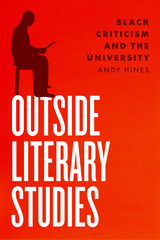
This striking contribution to Black literary studies examines the practices of Black writers in the mid-twentieth century to revise our understanding of the institutionalization of literary studies in America. Andy Hines uncovers a vibrant history of interpretive resistance to university-based New Criticism by Black writers of the American left. These include well-known figures such as Langston Hughes and Lorraine Hansberry as well as still underappreciated writers like Melvin B. Tolson and Doxey Wilkerson. In their critical practice, these and other Black writers levied their critique from “outside” venues: behind the closed doors of the Senate Permanent Subcommittee on Investigations, in the classroom at a communist labor school under FBI surveillance, and in a host of journals. From these vantages, Black writers not only called out the racist assumptions of the New Criticism, but also defined Black literary and interpretive practices to support communist and other radical world-making efforts in the mid-twentieth century. Hines’s book thus offers a number of urgent contributions to literary studies: it spotlights a canon of Black literary texts that belong to an important era of anti-racist struggle, and it fills in the pre-history of the rise of Black studies and of ongoing Black dissent against the neoliberal university.
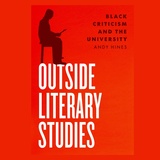
This is an auto-narrated audiobook edition of this book.
A timely reconsideration of the history of the profession, Outside Literary Studies investigates how midcentury Black writers built a critical practice tuned to the struggle against racism and colonialism.
This striking contribution to Black literary studies examines the practices of Black writers in the mid-twentieth century to revise our understanding of the institutionalization of literary studies in America. Andy Hines uncovers a vibrant history of interpretive resistance to university-based New Criticism by Black writers of the American left. These include well-known figures such as Langston Hughes and Lorraine Hansberry as well as still underappreciated writers like Melvin B. Tolson and Doxey Wilkerson. In their critical practice, these and other Black writers levied their critique from “outside” venues: behind the closed doors of the Senate Permanent Subcommittee on Investigations, in the classroom at a communist labor school under FBI surveillance, and in a host of journals. From these vantages, Black writers not only called out the racist assumptions of the New Criticism, but also defined Black literary and interpretive practices to support communist and other radical world-making efforts in the mid-twentieth century. Hines’s book thus offers a number of urgent contributions to literary studies: it spotlights a canon of Black literary texts that belong to an important era of anti-racist struggle, and it fills in the pre-history of the rise of Black studies and of ongoing Black dissent against the neoliberal university.
READERS
Browse our collection.
PUBLISHERS
See BiblioVault's publisher services.
STUDENT SERVICES
Files for college accessibility offices.
UChicago Accessibility Resources
home | accessibility | search | about | contact us
BiblioVault ® 2001 - 2024
The University of Chicago Press









